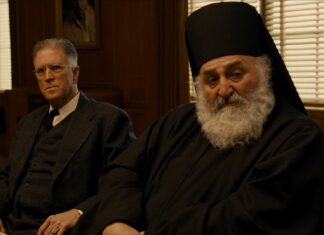By Aram Arkun
Mirror-Spectator Staff
WATERTOWN — Actor and director Gerald Papasian screened a video recording of the opera buffa “Gariné” on March 6 at the newly renovated Armenian General Benevolent Union (AGBU) center in Watertown and afterwards spoke about the research and support necessary to allow such jewels of Armenian heritage to be studied and made accessible. The event, cosponsored by the Amaras Art Alliance, the AGBU New England District Chapter, and the Tekeyan Cultural Association, included a dinner intermission.
The video of “Gariné,” a musical Papasian directed in France based on Dikran Tchouhadjian’s “Leblebiji Horhor Agha,” was an entertaining musical which, despite a relatively restricted budget, held its own and more compared to professional Parisian productions. Papasian in his talk spoke about the oblivion to which Armenian cultural and intellectual works have been condemned in the Western world. Without translation into English, French or other Western languages, they cannot be directly accessed despite their great value. Performance, of course, would be the next step ideally for theatrical and musical works.
The fate of Tchouhadjian’s works is a telling example. His “Arshak II,” the first Armenian and, for that matter, the first Eastern, opera, has been awaiting an authentic professional production for about 150 years, while just in the last year new more complete versions of “Leblebiji Horhor Agha” were discovered in a large French company’s archive. It was left to Papasian to pay for a copy of Tchouhadjian’s papers as an individual, but he still needs funds to scan more than 2,000 pages of scores and musical notations.
Armenians, said Papasian, are like shopkeepers who have nothing displayed in their store window and cry that nobody is coming into their store. Yet they have valuable items in the back of the store.







